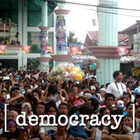
|
WHY MUSHARRAF'S USE OF FORCE AGAINST CIVIL REFORMERS IS DANGEROUS FOR PAKISTAN, THE REGION When Pervez Musharraf came to power in a military coup d'état in 1999, he promised to restore democracy fully within 3 years' time. Symbolic elections were held under a temporary constitution, beginning his first 5-year reign. Now, under a civilian constitution, Musharraf has been re-elected to a 2nd 5-year term, though the Supreme Court was about to issue a ruling on the legitimacy of his re-election, as he had not relinquished control of the military. Musharraf has long been seen by western powers as a useful ally in the quest to put down radical fundamentalist militia in his country and the region and to advance the dismantling of al-Qaeda, whose leadership is thought to be holed up in the mountainous northwestern provinces. But, he has come under fire from critics who say he has made too many pacts with fundamentalist clerics and militia and has failed to secure the northwestern border, thought to be a hot-bed of extremism. Now, to cap a year in which he has removed the chief justice, only to be forced by mass attorney protests to reinstate him, has presided over the tragic loss of life at the Red Mosque in the heart of Islamabad, and has been forced to allow his two former arch-rivals back into the country to seek high office, he has suspended the constitution, fired the chief justice, detained all top jurists who will not swear allegiance to him, and launched a campaign of arrest and intimidation against dissidents across the country, justifying his actions by saying he would not permit his country to "commit suicide". Where to begin? Opponents say Musharraf is showing signs of potentially catastrophic weakness, and that the show of force may be designed to buy time but will only accelerate his downfall. Already, within just two days, he was forced by foreign diplomats to agree that he will step down as army chief and become a civilian leader under a civilian constitution, but no date has been provided, and he insists that constitutional government will be restored at his discretion. Obviously, a democracy cannot easily maintain its institutions or respect for the rule of law in such an environment. And Musharraf's actions, after a year of continually doing so, are emboldening those who seek to depose him, some by violent means. Hundreds of people have been killed by insurgents, many using suicide bombs, since the disastrous handling of the Red Mosque rebellion. And, Pakistan is a nuclear state. So, we now face the possibility that precisely when the nation was about to return to constitutional democracy, with the backing of powerful allies and the elevation of the "moderate majority" within a secular civil structure, the likelihood of prolonged armed insurgency has been very seriously increased, by a provocation whose usefulness few observers can explain. If the forces of stability and democratization refuse to trust in the democratic process, and a viable political consensus cannot be formed between Musharraf and Bhutto, because the general refuses to relinquish his grip on military power, then opponents are not likely to put such trust in any of those institutions that would likely speed the stabilization of Pakistan as a democratic state, and Islamist militants will gain popularity, as they have under the thumb of other repressive regimes —Egypt, Saudi Arabia— or in cases of lawless bloodletting —Somalia, Afghanistan—, putting at risks the long-term interests of Pakistan, its neighbors, and the world. With a population of 167 million, Pakistan is one of the most populous nations on Earth, and the political stability of institutions that control its nuclear arsenal is of paramount interest to all people everywhere. A fundamentalist junta or a protracted multi-factional civil war could destabilize much of Asia, not to mention the nerves it would fray in various nuclear-armed states (Russia, China, India, Israel, and —potentially— Iran). The Kashmir crisis could spin out of control, and long-term peace negotiations be set back decades. The likely increase in political tensions driven by water scarcity would also mean that a lack of stable and responsible democratic rule in Pakistan can easily spill over into neighboring states. MUSHARRAF DECLARES MARTIAL LAW, SUSPENDS CONSTITUTION Pakistan pres. Pervez Musharraf, a general who came to power by 'bloodless' military coup in 1999, has been facing opposition from a national lawyers organization that says he has delayed too long in restoring the democratic process, and was facing a Supreme Court ruling that might invalidate his recent re-election. Musharraf claims he had no choice but to suspend the constitution, because Pakistan's "sovereignty" was under threat from "paralysis of government by judicial interference". The imposition of martial law, 8 years after taking power with the promise to restore democracy, is a shocking move for the general, who has been under pressure from all quarters to relinquish his role as head of the military and rule as a civilian president, elected by the people in free elections. The Supreme Court was to vote on the validity of his recent re-election to the presidency, given his refusal to relinquish control of the military. Early statements suggested Musharraf intends to rule by military decree until the elections are over: observers warn the election could not be considered legitimate if the constitution that governs it and which those elected must serve, is not in effect at the time of the vote. [Full Story] |
||||||
|
|||||||
